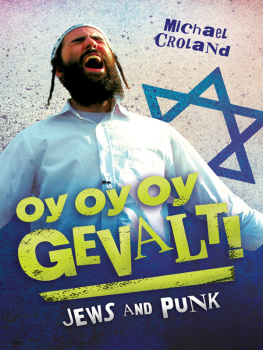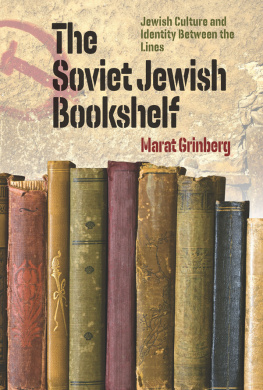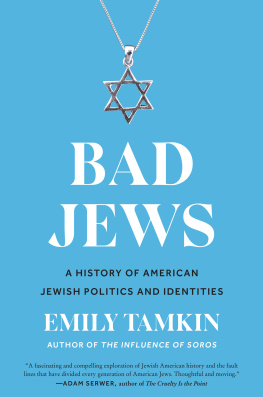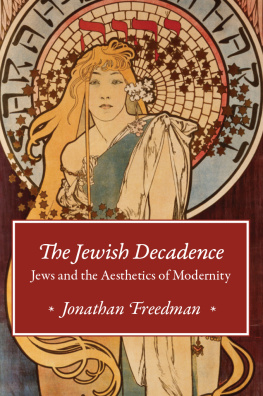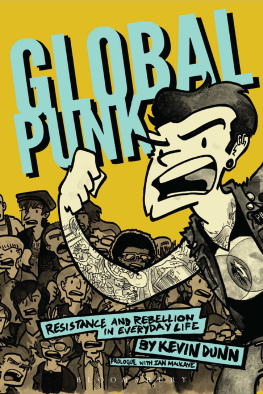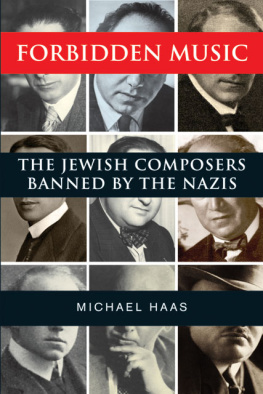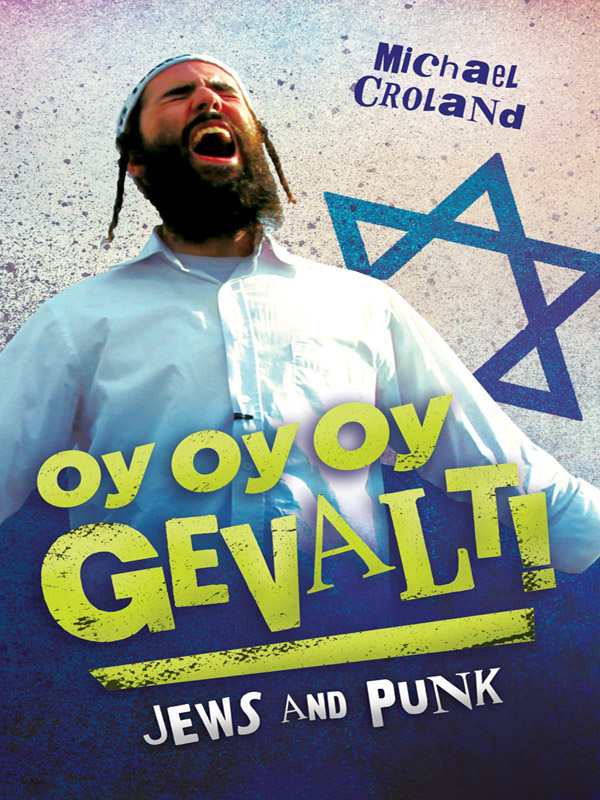Oy Oy Oy Gevalt!
Jews and Punk
For Mom, with love, for all her help and support
Copyright 2016 by Michael Croland
All rights reserved. No part of this publication may be reproduced, stored in a retrieval system, or transmitted, in any form or by any means, electronic, mechanical, photocopying, recording, or otherwise, except for the inclusion of brief quotations in a review, without prior permission in writing from the publisher.
Library of Congress Cataloging-in-Publication Data
Names: Croland, Michael, author.
Title: Oy oy oy gevalt! : Jews and punk / Michael Croland.
Description: Santa Barbara, California : Praeger, [2016] | 2016 | Includes bibliographical references and index.
Identifiers: LCCN 2016006520 | ISBN 9781440832192 (print : alk. paper)
Subjects: LCSH: Punk rock musicHistory and criticism. | Jewish punk rock musicians. | JewsMusicHistory and criticism. | Jewish radicals.
Classification: LCC ML3534 .C76 2016 | DDC 781.66089/924dc23
LC record available at http://lccn.loc.gov/2016006520
ISBN:978-1-4408-3219-2
EISBN: 978-1-4408-3220-8
201918171612345
This book is also available as an eBook.
Praeger
An Imprint of ABC-CLIO, LLC
ABC-CLIO, LLC
130 Cremona Drive, P.O. Box 1911
Santa Barbara, California 93116-1911
www.abc-clio.com
This book is printed on acid-free paper 
Manufactured in the United States of America
Lyrics from the following songs appear in this book and were used with written permission of the artists. All rights reserved.
The Mohel Song by Schmekel, 2011 by Schmekel
Homotaschen by Schmekel, 2013 by Schmekel
I Watched the Temple Fall by the Shondes, 2007 by the Shondes
Loshon Hara by Moshiach Oi!, 2008 by Moshiach Oi! (Shabasa Records)
Avraham Was a Punk Rocker by Moshiach Oi!, 2011 by Moshiach Oi! (Shabasa Records)
The New Song by Moshiach Oi!, 2011 by Moshiach Oi! (Shabasa Records)
7:40 by Golem, 2014 by Golem/Discos Corason, S.A.
Disclaimer
This book may feature subjects who espouse radical, controversial, provocative, and offensive views. The author and the publisher do not necessarily endorse their views.
Contents
Oy!
Oi!
Unless someone has a thick Yiddish or British accent, these exclamations are pronounced the same way. For people looking to bridge their Jewishness and punk, the shared Oy!/Oi! exclamation comes up often. It is one of numerous examples of how people who feel a connection between Jewishness and punk find and create common ground that allows these two worlds to gel together.
Oy! is a common Yiddish word that roughly translates to Oh! It expresses dismay or disbelief, sometimes sarcastically. It can be used on its own and in such sayings as oy vey, oy gevalt, and oy oy oy.
Oi! is a punk slogan rooted in the British working class and heard at soccer games in the United Kingdom. As punk rock grew, the Oi! Oi! Oi! chant could be heard from a variety of punk rock acts, not just skinhead Oi! bands.
When Jewish punks say Oy! or Oi! they are often referring to both. They are simultaneously affirming their own associations with both Jewishness and punk. At times, they are taking the bite out of the bigoted connotations of Oi! by reclaiming the word with a Jewish flair. For some Jewish punks, though, the negative aspects of Oi! were not a factor or not even realized.
Nevertheless, many who used Oy! were not consciously following NOFXs lead.
One Jewish punk group even put Oi! in its name: Moshiach Oi! We scream Oi! a lot, explained Moshiach Oi! singer Yishai Romanoff.
Schmekel exclaimed Oy! 130 times in Hold My Yod. Schmekel singer/guitarist Lucian Kahn explained, Its a combination of the Oy! of Oy vey!like Oh, no, that kind of Oy! of frustration that comes with the Jewish Oy vey!and the punk Oi!, which is sort of an enthusiastic battle cry of punk rebellion and awesomeness, and sort of smashing it all together.
Golem, a klezmer band with a punk edge, typically opened its shows with shtick in which singer Annette Ezekiel Kogan wailed Oy! many times. She said that in this context, she was saying the Yiddish Oy!
Its an identification of both punk and Judaism, said Steve Gangsta Rabbi Lieberman, the self-professed King of Jewish Punk. He recalled that Oy!/Oi! had been used by other punk rock bands, both Jewish and not, as well as by his grandfather. The Gangsta Rabbi chanted Oy! Oy! Oy! in the songs Jewish Riot, Crank That Kosher Boy, The Meat I Eat, and Fall Out Boy Oy! Oy! Oy! He also named a live album Jewish RiotOy! Oy! Oy!
The Gangsta Rabbi was inspired to employ Oy! after learning of a peculiar news story that showed just how varied the associations with Oy!/Oi! were. In 1995, a punk rock band chanted Oi! in a song that it performed at a high school talent show in New Jersey. Parents complained to the school about anti-Semitism, and police looked into He added, The word oy by itself cannot be considered hateful. Although Oi! can be linked to racism and anti-Semitism in some contexts, the accusations in this case were misplaced and ridiculous.
Like the slogan, Jewish punks are often misunderstood. Their antics can leave even the most ardent fans smacking their foreheads and shouting Oy! They loudly and proudly identify as Jewish and punk in ways that they find personally meaningful. Oy Oy Oy Gevalt! Jews and Punk will shed light on how they do so.
Gefilte Fuck put a punk spin on Jewish music and culture in Los Angeles in the early 1990s. GF singer Howard Hallis would take the stage clutching a bottle of Manischewitz wine and wearing a tallis (prayer shawl). Because he did not wear a shirt, onlookers could see that Hallis had a tattoo, something that is common among punks but prohibited by Jewish law. Youre all a bunch of G-ddamn b*stards! Oy! he would scream. This added an extra level of chaos for concertgoers who would flail their bodies around wildly and slam into each other, what is called slam-dancing or moshing. At some shows, a hora (a traditional Jewish circle dance) encircled the slam-dancers, syncretizing Jewish and punk cultural elements.
GF largely played punk rock covers of well-known Jewish songs like Hava Nagila, Diyanu, and Dreidel Song. Like much punk rock, GFs music was loud and abrasive and featured a heavy, distorted guitar sound. GF made poor-quality recordings of five songs, which it did not release until after the band broke up.
Hitting it big was not the goal. GF did not aim to perform faithful renditions of Jewish standards or celebrate its Jewishness in a traditional way either. Rather, in GFs short run of approximately eight shows, the members of GF boldly declared that they were taking their Jewishnessthe songs they knew, the religion and culture they had grown up with, and the identity that was undeniably a part of themand doing it in their own unorthodox way. It was a gag, but the band was serious about the entertainment value at least. The members of GF took tangible, familiar icons of their Jewishnesssongs like Hava Nagila and foods like gefilte fishand put their own stamp on it. The members of GF revamped Jewish music in a way that worked for them. GF was edgy, subversive, proud, fun, and funny. GF was Jewish, and it was punk. The members of GF were true to themselves and acted on their own terms.
Jews have played prominent roles in punk since its inception in the 1970s. Mostly since the mid-1990s, Jews have turned to punk as a way of exploring their Jewishness, through music and other cultural avenues. In addition, punk rock influenced a number of contemporary musicians playing klezmer or other traditionally Jewish musical styles. Some Jewish punks looked to balance a nice Jewish boy (or girl) identity with an against-the-grain bad boy (or girl) identity. Punk served as a platform to navigate between, on the one hand, their Jewishness and, on the other hand, American culture and society at large.

